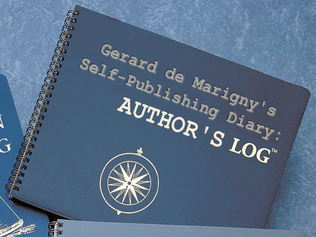|
6/6/2011 Author's Log: Stardate 06062011The word for today is consistency!
Like most, I didn't pay much attention to how long it took me to publish my first novel. As it worked out, it took me a total of six months from conception to being published. All in all, not bad. I should also note I'd spent a year on a previous manuscript that I decided not to publish, so I was also improving my pace with my first published work. Being a "quant" by nature, I keep an Excel worksheet for my daily progress with each novel. It serves a few purposes: + I can see a snapshot of chapter headings, to help with continuity + I can monitor chapter lengths - so I can try and deliver a consistent reading experience to my readers (if they're like me, they read in chapter chunks. I personally hate one chapter being a page long followed by the next being a small novel in itself.) + I can monitor my overall progress and pace. In my past life, I was a trained performance measurement analyst, which means I'm trained to measure efficiency in any process. Performance measurement analysts are trained to do three things: 1-Data measurement - this includes data gathering, aka record-keeping. 2-Data attribution - Attribution means attributing performance to specific causes. 3-Data evaluation - This is where you draw conclusions from analyzing the attributions. In the end, a performance measurement analyst is not only supposed to point out how much efficiency is contained in a process but also where it came from AND where inefficiencies exist. After applying my performance measurement analysis to the writing progress with my first novel, I noticed one blaring inefficiency - consistency ... or rather, the lack of consistency. I know ... writing is an art form and like any art form, one may argue that inspiration is not evenly distributed across days. Yet, the professional writer develops his creative disciplines so that he CAN create everyday. With journalists, the source of inspiration comes from the stories themselves. A journalist's creativity really lies in his angle ... his perspective. With non-fiction writers, the source of inspiration comes from their platform ... their expertise. A non-fiction writer's creativity lies in the delivery of his expertise and his novel approach. But, what about fiction writers? The definition of a fiction writer is "a person that makes stuff up then writes it down." Hmm, not much inspiration there, of itself. As most new fiction writers discover, making stuff up that's cohesive, interesting and original isn't easy, day after day. Like any craft, after being taught the fundamentals, the secret lies in practice. The saying 'practice makes perfect' may not be a realistic one in writing fiction, but 'practice makes better and better' is definitely true. Practice in writing is like practice in law or in medicine. In other words - the act of doing it IS the practice! My point: the only way to practice writing fiction is to write fiction - and like with anything - the more you practice, the better you get! There's one additional component though - consistency. The inefficiency I spoke about with writing my first novel was illustrated by my daily log of writing volume. It was very inconsistent. I would write 3,000 words one day followed by 300 words the next, followed by three days of no words followed by 800 words followed by another five days of no words ... followed by another day of 3,000 words. <audible exhale> That is NOT a process that I'm proud of - nor is it one that I can depend upon in order to achieve my objective of writing 3-4 novels per year. So, starting with this second novel of mine - the sequel to the first, I've not only been working on 'making stuff up' but doing so on a consistent basis. I'm creating my own discipline. I think discipline is important to improving any art form. I'm starting simply be attempting to write something every single day (except the Sabbath). So far, its working. With my first novel, when averaging my (mean) output with that 'feast or famine" approach I utilized, I was only writing about 700 words per day. By concentrating on writing six days/week, while I'm still not writing 3,000 words per day/average, I've doubled my average to around 1,400 words. That's progress. All I really did was cut out my downtime - and all I needed to do to accomplish that was employ discipline. Last point: A writer-acquaintance of mine became upset with me for daring to have a 3-4 full-length novel objective, telling me that there was "no way" to turn out quality work, at that volume. My reply is - THAT'S HOGWASH! Like I said, like with anything else, writing is a craft at which you improve through practice ... and we practice writing by writing! In order to practice more, I created and employed my own discipline. My discipline is now allowing me to bear the fruit of consistency and consistency is leading to more quality output for me! Hey, I'm not saying you should use my discipline - create your own and watch your quality and output increase. Back to writing ... End transmission (Please feel free to leave comments – your comments can be as helpful as anything I write for others. I hope this series turns out to be less my talking at you and more – a group of like-minded storytellers that self-publish or intend to. Peace & God Bless!)
"...there was "no way" to turn out quality work, at that volume..." 10,000 words/day - fantastic! You just set my target Steve! Re: Literary's Symphony Hall ... save me a seat! 9-) B/t/w ... I just added you to my "first round's on me list" if you ever come to Las Vegas. You're on the list with Sensei Dean, Kris, Konrath (if he ever leaves Chicago), and Passive Guy ... there's others, so I better get back to writing the stuff I'm trying to sell. 9-) 6/6/2011 04:28:14 pm
Consistency is my word for 2011 and so far it's been great. Having a day job and wanting a social life, I set up a goal of 6000 words a week of new writing on a novel and 6000 on editing the previous. That nets me 3 novels a year. If I ever get rid of the day job I could easily pump that number up to 4 novels and a whole lot of short stories.
I like the fact you set time out for the previous edit, Alex, and at the same volume as your writing. I'm more one to set an entire week blocked out for editing but I may try your way and see how it works for me. Thx! Comments are closed.
|
Click to go to the Official Web Page of Gerard de MarignyAbout Gerard de MarignyGerard de Marigny is an American novelist and screenplay writer. His newest release is WHITE WIDOW (Cris De Niro, Book 7) and he is currently writing the sequel to the Amazon-Bestselling Modern War Western, JOSHUA'S COUNTRY. Archives
July 2021
CategoriesAll Amazon Free Copies For Reviews Kindle New Novel & Audiobooks In June! Rise To The Call Self-Publishing Signs Of War Signs Of Warr The Watchman Of Ephraim |
- Self-Publishing Diary: Author's Log
-
Titles by Gerard de Marigny
-
CRIS DE NIRO Series
>
- The Watchman of Ephraim (Cris De Niro, Book 1)
- Signs of War (Cris De Niro, Book 2)
- Rise to the Call (Cris De Niro, Book 3)
- Project 111 (Cris De Niro, Book 4)
- The Eagle's Plume (ARCHANGEL Mission Logs #1)
- Nothing So Glorious (Cris De Niro, Book 5)
- Rescue From Sana'a (ARCHANGEL Mission Logs #2)
- New Detroit (Cris De Niro, Book 6)
- White Widow (Cris De Niro, Book 7)
- JOSHUA'S COUNTRY Series >
-
CRIS DE NIRO Series
>
- Self-Publishing Diary: Author's Log
-
Titles by Gerard de Marigny
-
CRIS DE NIRO Series
>
- The Watchman of Ephraim (Cris De Niro, Book 1)
- Signs of War (Cris De Niro, Book 2)
- Rise to the Call (Cris De Niro, Book 3)
- Project 111 (Cris De Niro, Book 4)
- The Eagle's Plume (ARCHANGEL Mission Logs #1)
- Nothing So Glorious (Cris De Niro, Book 5)
- Rescue From Sana'a (ARCHANGEL Mission Logs #2)
- New Detroit (Cris De Niro, Book 6)
- White Widow (Cris De Niro, Book 7)
- JOSHUA'S COUNTRY Series >
-
CRIS DE NIRO Series
>
Search by typing & pressing enter


 RSS Feed
RSS Feed

